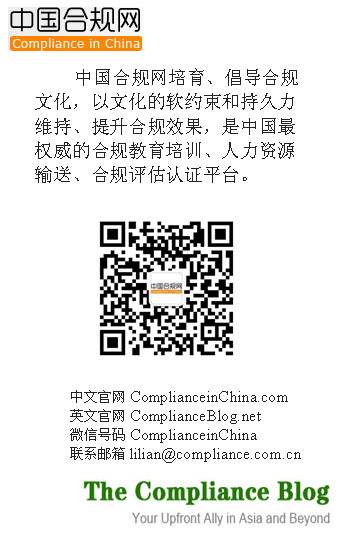One of China’s anti-bribery laws is the Anti-Unfair Competition Law (AUCL). An offense involves the free functioning market competition that the AUCL was formulated to protect.
Article 8 of the AUCL provides that: “a business operator shall not resort to bribery, by offering money or goods or by any other means, in selling or purchasing commodities. A business operator who offers off-the-book rebates in secret to the other party, whether unit or individual, shall be deemed and punished as offering bribes; and any unit or individual that accepts off-the-book rebates in secret shall be deemed and punished as taking bribes.
"A business operator may, in selling or purchasing commodities, expressly allow a discount to the other party and pay a commission to the middleman. The business operator who gives discounts to the other party and pays commissions to the middleman must truthfully enter them in the account. The business operator who accepts the discount or the commission must also truthfully enter it in the account.”
As such, the AUCL provides for a blanket prohibition on a wide range of commercial bribery activities, by which a company or enterprise may use valuables or other methods to induce its counterparty to buy or sell goods. Commercial bribery is thus conducted, from the perspective of Administrative for Industry and Commerce (AIC) – the administrative agency of China in fighting commercial bribery as well as executing other business-administering functions, with competition disordered and impaired. Some cases, however, are arguable as investigated as a bribery case, which might be better illustrated by the following case study.
In early 2010, the AIC of Qingyang County, Anhui Province, investigated 11 stall keepers at the Qingyang railway station. Among these stall keepers, a private business owner named Chen Zhigang (“Mr. Chen”) was found to have given three bottles of water (which normally cost RMB 0.6 per bottle, or about $.10 each) and a bottle of cola (which normally costs RMB 2 per bottle, or $.33) as gifts to another retailer in order to induce that retailer to purchase a carton of cola for RMB 52, or about $8.50 (which is the typical wholesale price for such a carton).
At a total of $.63, this may be the smallest amount of money at issue in any commercial bribery enforcement action in history.
After an investigation into the matter, on Mar 24, 2010, the Qingyang County AIC issued an administrative punishment decision (No. 4 [2010] of AICQY) convicting Mr. Chen of commercial bribery and fining him RMB 10,000 ($1,630) with a daily overdue payment of three percent if he failed to pay the penalty within the required period.
The decision of the AIC is worth discussion as the line between “business conduct” and “commercial bribery” is too blurry to determine because of the current definition of commercial bribery. In fact, Mr. Chen is not the only one who has suffered such a contentious punishment; many large enterprises have had similar experiences. These investigations and punishments have the potential to bring an assortment of risks to companies, including significant damage to a company’s reputation, which can have a direct impact on business operations and development prospects, and which may be more serious than a penalty issued by an enforcement agency.
We can call for the legislature or enforcement agencies to amend the relevant provisions or adjust their enforcement practices, but until that happens, enterprises will continue to be exposed to the related risks, and should enhance their risk management strategies accordingly.
_________
* This article was originally published at http://www.fcpablog.com/blog/2013/7/29/the-smallest-commercial-bribe-in-history.html
** Licensed in the PRC and the New York State of the U.S., Henry Chen, the author, is a Shanghai-based partner at MWE China Law Offices in stratetic alliance with McDermott Will and Emery.
Henry has extensive experience representing enterprises in administrative and criminal investigations of alleged commercial bribery cases; providing counsel for the investigation of employee misconducts; helping clients conduct pre-merger due diligence investigations and post-merger integrations; providing training and seminars in Chinese and English to the employees of MNCs regarding anti-corruption and bribery pitfalls; providing FCPA investigations and auditing for the presence of American companies in China and for companies listed in the U.S.; helping companies update and strengthen their internal anti-corruption compliance programs and controls and tailoring them to the unique features of Asian markets.
Henry’s research about FCPA enforcement and Chinese anti-bribery and -corruption law has been published or quoted in leading publications, including the Bloomberg Asia Pacific Law Report, Wall Street Journal, China Law & Practice and ALB. Henry is also the host of Linkedin groups: "Compliance in China” and “Anti-Corruption Compliance Asia.”
Henry is available at henrychen@mwechinalaw.com






